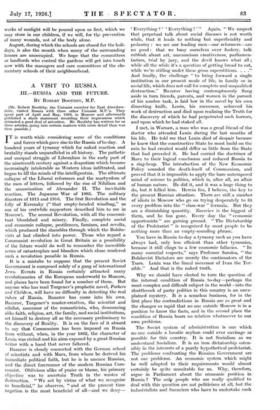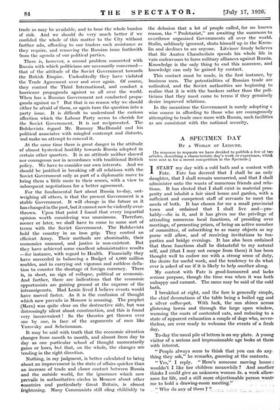A VISIT TO RUSSIA
(Mr. Robert Boothby, the Unionist member for East Aberdeen. shire, visited Russia with three other Unionist M.P.'s. They spent part of April and May, 1926, in Moscow and afterwards published a short statement recording their impressions which attracted a good deal of attention. Mr. Boothby has written for us three articles, -going into certain matters with more detail than was then possible.) TT is worth while considering some of the conditions -I- and forces which gave rise to the Russia of to-day. A hundred years of tyranny which for naked reaction and brutality stands unparalleled in all history. The pathetic and unequal struggle of Liberalism in the early part of the nineteenth century against a despotism which became increasingly intolerable as Western ideas infiltrated, and began to fill the minds of the intelligentsia. The ultimate collapse of the Liberal reformers and the martyrdom of the men of letters, followed by the rise of Nihilism and the assassination of Alexander II. The inevitable reaction. The Japanese War of 1905. The military disasters of 1915 and 1916. The first Revolution and the folly of Kerensky (" that empty-headed windbag," as one of his erstwhile supporters described him to me in Moscow). The second Revolution, with all the concomi- tant bloodshed and misery. Finally, complete social and economic collapse, pestilences, famines, and revolts, which produced the shambles through which the Bolshe- vists at last climbed into power. Those who regard a Communist revolution in Great Britain as a possibility of the future would do well to remember the incredible series of catastrophes and blunders which alone rendered such a revolution possible in Russia.
It is a mistake to suppose that the present Soviet Government is composed solely of a gang of international Jews. Events in Russia certainly attracted many revolutionaries of the European underworld to Moscow, and places have been found for a number of them. But anyone who has read Turgenev's prophetic novel, Fathers and Children, will have no difficulty in detecting the real rulers of Russia. Bazarov has come into his own. Bazarov, Turgenev's master-creation, the scientist and nihilist, successor of the romanticists, who, denouncing alike faith, religion, art, the family, and social institutions, set himself to destroy all as the necessary preliminary to the discovery of Reality. It is on the face of it absurd to say that Communism has been imposed on Russia from without, when, in the year 1862, the character of Lenin was etched and his aims exposed by a great Russian writer with a hand that never faltered.
Bazarov is closely connected with the German school of scientists and with Marx, from whom he derived his immediate political faith, but he is in essence Russian, and the direct forerunner of the modern Russian Com- munist. ' Oblivious alike of praise or blame, his -primary objective was to ascertain Truth in the wastes 'of destruction. " We act by virtue of what we recognize as beneficial," he observes, " and at the present time negation is the most beneficial of all—and we deny— Everything ? ' Everything ! ' " Again, " We suspect that perpetual talk about social diseases is not worth while, that it leads to nothing but superficiality and pedantry : we see our leading men—our reformers—are no good : that we busy ourselves over foolery, talk rubbish about art, unconscious creativeness, parliamen- tarism, trial by jury, and the devil knows what all ; while all the while it's a question of getting bread to eat, while we're stifling under these gross superstitions. . . ." And finally, the challenge " to bring forward a single institution in our present mode of life, in family or in social life, which does not call for complete and unqualified destruction." Bazarov having contemptuously flung aside in turn friends, parents, and women in the pursuit of his sombre task, is laid low in the novel by his own dissecting knife. Lenin, his successor, achieved his work of destruction and died upon realizing the Truth for the discovery of which he had perpetrated such horrors, and upon which he had staked all.
I met, in Warsaw, a man who was a great friend of the doctor who attended Lenin during the last months of his life. He told me that Lenin died of despair because he knew that the constructive State he must build on the ruin he had created would differ so little from the State that had preceded it. He had carried the doctrines of Marx to their logical conclusion and reduced Russia to a slag-heap. The introduction of the New Economic Policy sounded the death-knell of Communism, and proved that it is impossible to apply the bare untempered mind of science to politics, which is, after all, an affair of human nature. He did it, and it was a huge thing to do, but it killed him. Herein lies, I believe, the key to the present Russian situation. There are still a number of idiots in Moscow who go on trying desperately to fit every, problem into the " class-war " formula. But they are a diminishing quantity. Zinoviev is the biggest. of them, and he has gone. Every day the " economic opportunists " are gaining ground. " The Dictatorship of the Proletariat " is recognized by most people to be nothing more than .an empty-sounding phrase.
You have in Russia to-day a tyranny such as you have always had, only less efficient than other tyrannies, because it still clings to a few economic fallacies. " In many essential respects," says Professor Sarolea, " the Bolshevist Dictators are merely the continuators of the Tsars. Lenin was the lineal successor of Ivan the Ter- rible." And that is the naked truth. _ Why we should have elected to turn the question of the internal condition of Russia to-day—perhaps the most complex and difficult subject in the world—into the shuttlecock of party politics in this country is an unex- plained mystery. It is a senseless business, for in the first place the contradictions in Russia are so great and the changes so rapid that no one outside Moscow is in a position to know the facts, and in the second place the condition of Russia bears no relation whatsoever to our own problems.
The Soviet system of administration is one which no one outside a lunatic asylum could ever envisage as possible for this country. It is not Socialism as we understand Socialism. It is an iron dictatorship osten- sibly in the interests of a purely hypothetical proletariat. The problems confronting the Russian Government are not our problems. 'An economic system which might be well adapted to their requirements would almost certainly be quite unsuitable for us. Why, therefore, argue in Parliament about the economic position in Russia ? The only people who are really qualified to deal with this question are not politicians at all, but the industrialists and financiers who have to undertake such trade as may be available, and to bear the whole burden of risk. And we should do very much better if we confided the whole of this matter to the City without further ado, affording to our traders such assistance as they require, and removing the Russian issue forthwith from the agenda of our political parties.
There is, however, a second problem connected with Russia with which politicians are necessarily concerned— that of the attitude of the Soviet Government towards the British Empire. Undoubtedly they have violated the Trade Agreement over and over again. Of course, they control the Third International, and conduct a hurricane propaganda against us all over the world. When has a Russian Government not conducted propa- ganda against us ? But that is no reason why we should either be afraid of them, or again turn the question into a party issue. It is difficult to understand the curious affection which the Labour Party seems to cherish for the Soviet Government. It is not reciprocated. The Bolshevists regard Mr. Ramsay MacDonald and his political associates with mingled contempt and distaste, Ind make no attempt to conceal it.
At the same time there is great danger in the attitude of almost hysterical hostility towards Russia adopted in certain other quarters. It is an attitude neither shrewd nor courageous nor in accordance with traditional British policy. We have to consider our own interests. And we should be justified in breaking off all relations with the Soviet Government only as part of a diplomatic move to bring them a little more to their senses, with a view to subsequent negotiations for a better agreement.
For the fundamental fact about Russia to-day, out- weighing all others, is that the present Government is a stable Government. It will change in the future as it has changed in the past, but it cannot now be violently over- thrown. Upon that point I found that every impartial opinion worth considering was unanimous. Therefore, sooner or later, we shall have to come to some sort of terms with the Soviet Government. The Bolshevists hold the country in an iron grip. They control an efficient Army. Their methods are abominable, their economics unsound, and justice is non-existent. But they have achieved some excellent administrative results —for instance, with regard to Health. Financially they have succeeded in balancing a Budget of 4,000 million roubles, and in carrying out vigorous and ruthless defla- tion to counter the shortage of foreign currency. There is, in short, no sign of collapse, political or economic. And further, there are indications that the economic Opportunists are gaining ground at the expense of the intransigeants. Had Lenin lived I believe events would have moved faster. As it is the confusion of thought which now prevails in Moscow is amazing. The prophet (Marx) was quite clear on the destructive side, but was distressingly silent about construction, and this is found very inconvenient ! So the theories get thrown over one by one, in face of the arguments of men like Yurovsky and Scheinmaim.
It may be said with truth that the economic situation changes from month to month, and almost from day to day as one particular school of thought momentarily gains or loses, but that, on the whole, the changes are tending in the right direction.
Nothing, in my judgment, is better calculated to bring about an improvement in the state of affairs quicker than an increase of trade and closer contact between Russia and the outside world, for the ignorance which now prevails in authoritative .circles in Moscow about other tountries and - particularly Great Britain, is almost frightening. -Many- Communists still cling childishly to the delusion that a lot of people called, for no known reason, the " Proletariat," are awaiting the summons to overthrow organized Governments all over the world. Stalin, sublimely ignorant, shuts himself up in the Krem- lin and declines to see anyone. Litvinov firmly believes that Sir Austen Chamberlain spends his whole life in vain endeavours to form military alliances against Russia. Knowledge is the only thing to end this nonsense, and knowledge can only be gained by contact.
This contact must be made, in the first instance, by business men. The potentialities of Russian trade are unlimited, and the Soviet authorities are beginning to realize that it is with the bankers rather than the poli- ticians that they must come to terms if they genuinely desire improved relations.
In the meantime the Government is surely adopting a wise course in affording to those who are courageously attempting to trade once more with Russia, such facilities as are consistent with the national security.











































 Previous page
Previous page